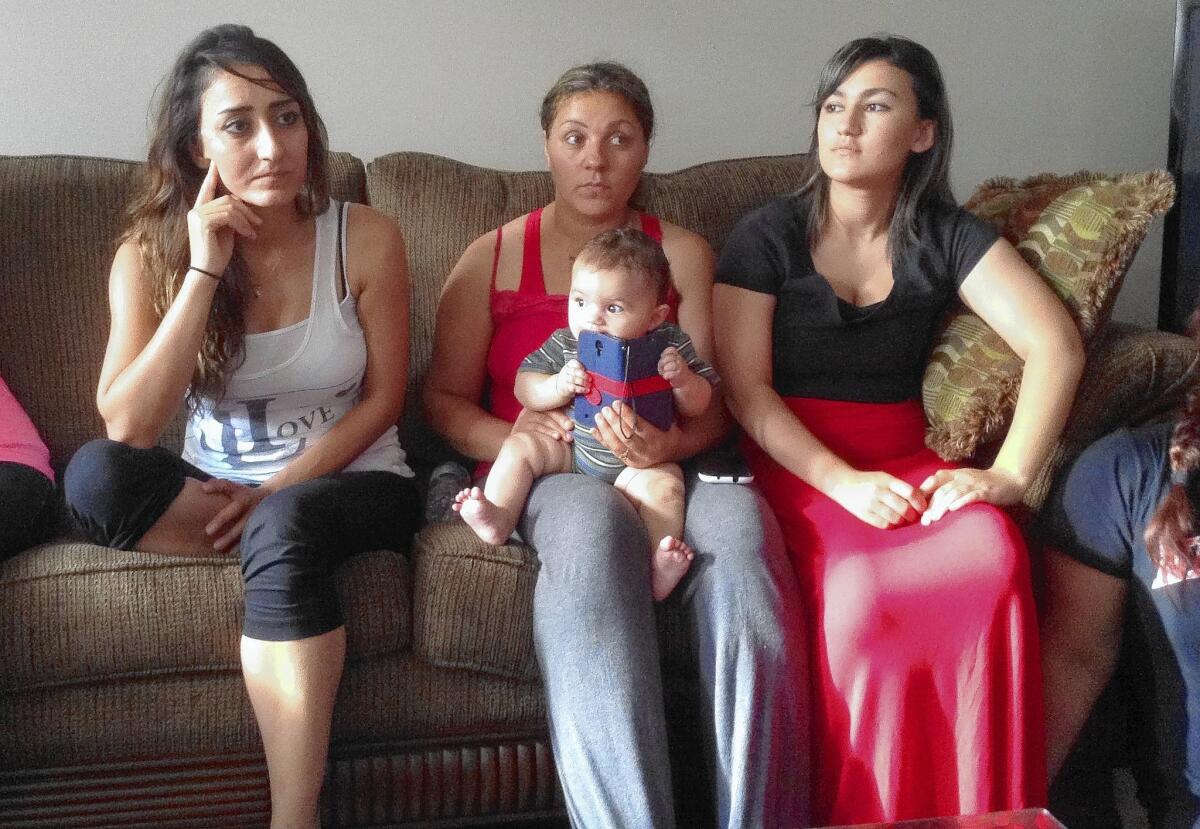In Nebraska, Yazidi community is paralyzed by guilt

- Share via
Reporting from LINCOLN, Neb. — When they cook, they weep, knowing their relatives in Iraq have nothing to eat. When they see their beds, they think of those trapped on a mountaintop who must sleep on nothing but rocks.
Many members of the Yazidi community here say they have stopped eating, sleeping and going to work. Surrounded by cornfields and Husker football fans, they stare at their phones and wait for news from northern Iraq, as if connected to their kin by a psychic tether.
Iraqi Yazidis could face genocide, President Obama said last week as he announced the U.S. would drop water and food to those who fled the Islamic State, an Al Qaeda breakaway faction that has seized huge chunks of territory in Iraq and neighboring Syria. Tens of thousands of Yazidis took shelter atop Mt. Sinjar when militants overran the city of Sinjar, center of the Yazidi community.
Yazidis in Lincoln said some members of the community were so depressed that they couldn’t get out of bed, and others had attempted suicide. A nurse, Sharifa Khalil, 26, said more than 20 people had been hospitalized for stress-related reasons, including dehydration and fainting.
Hakima Antar, 26, sat on the floor of a crowded apartment where Yazidis had gathered, weeping quietly and clutching a napkin. “I feel guilty when I see food or when I eat,” she said through an interpreter. “I look at the food and I can’t even eat, because they are hungry over there. ... I can’t even sleep.”
Antar, who is five months pregnant, was among those who went to a hospital because of stress. She said her sister and her sister’s five children have been trapped on Mt. Sinjar. Antar said the doctor told her she needed to eat to protect her pregnancy, but she is having trouble following his instructions.
“This is a life inside of me,” Antar said. “I can’t help them, but I can help this one — but I can’t eat. I can’t eat.”
The Lincoln community, thought to number in the hundreds, has been inundated with videos and images of relatives and children begging for help. Islamic State propaganda and horror stories from Iraq of starvation, dehydration and enslavement of Yazidi women have devastated what is thought to be the largest American community of this ancient religious sect, related to Zoroastrianism.
Although the stories from Iraq cannot be independently confirmed, Yazidis here have no doubt of their relatives’ plight. No doubt, and much fear.
Three former U.S. military interpreters gathered in a darkened living room of a Lincoln duplex, where they and their wives were staying to keep from being alone.
“If I was not here, I would kill myself,” said Fares Baki, 29, who moved to the U.S. in December.
Baki said his brother and his brother’s four children have been trapped on Mt. Sinjar without food or water, and the humanitarian airdrops have not reached them. The brothers have kept in touch by phone, he said, but many Yazidis say their relatives’ phones are dying.
Baki, whose wife in Lincoln gave birth to a boy days ago, was disconsolate about events on the other side of the world. “If I call [my brother] and he says no water, no food, and the kids almost die, I’ll try to kill myself,” he said.
Another former military interpreter who moved to the U.S. in 2012 said one of his three sisters in Iraq was captured by Islamic State militants last week and was keeping in touch with him through a cellphone she had smuggled into a jail beneath her clothing. Faisal, 33, asked that his last name not be used to protect her identity.
“Before I come here, and just now, I tried, I couldn’t get ahold of her,” Faisal said Sunday. “Since yesterday she’s been telling me that she only has one bar of battery charge left.”
His sister told him Islamic State militants had separated the older women from the younger women and had taken the boys away. She saw militants kill a pregnant Yazidi and tear out her belly, he said.
“I’m just shocked and frozen — I can’t even cry anymore,” said Faisal, running a finger along his chin as he stared off in the direction of kitchen cabinets. “I hear things sometimes, and I laugh.”
Then Faisal fell silent.
Even without independent confirmation, the horror stories have psychologically ravaged the Yazidi community. They need help, and they don’t know where to get it.
Twelve young Yazidi women, a man and two babies crammed onto sofas and on the floor in a small Lincoln apartment to discuss what organizations or celebrities might be willing to help Iraqi Yazidis, especially the kidnapped women. Perhaps Oprah, they wondered.
But the women frequently turned to their phones, scrolling through photos of relatives stranded in Iraq where, some women said, they see no future for their people.
Douly Khalaf, 24, began playing a Facebook video of a young Yazidi boy, surrounded by other boys, hollering plaintively into the camera.
“Come help us,” Khalaf translated from the boy’s Kurdish, punctuating each burst of his pleading. “We didn’t do anything. We don’t have water.”
Sharifa Khalil swaddled her 6-month-old daughter, Alayna, and commiserated with the others over how the crisis had brought their lives to a stop.
“I have three kids and I haven’t been able to take care of them — this is my only day I have my baby,” Khalil said, adding that relatives have been helping care for her children. “Every time I cook, I cry. I keep thinking how nobody have food. Every time I try to sleep I can’t even look at my bed. ... It’s like, how do you live?”
Twitter: @mattdpearce
More to Read
Sign up for Essential California
The most important California stories and recommendations in your inbox every morning.
You may occasionally receive promotional content from the Los Angeles Times.














